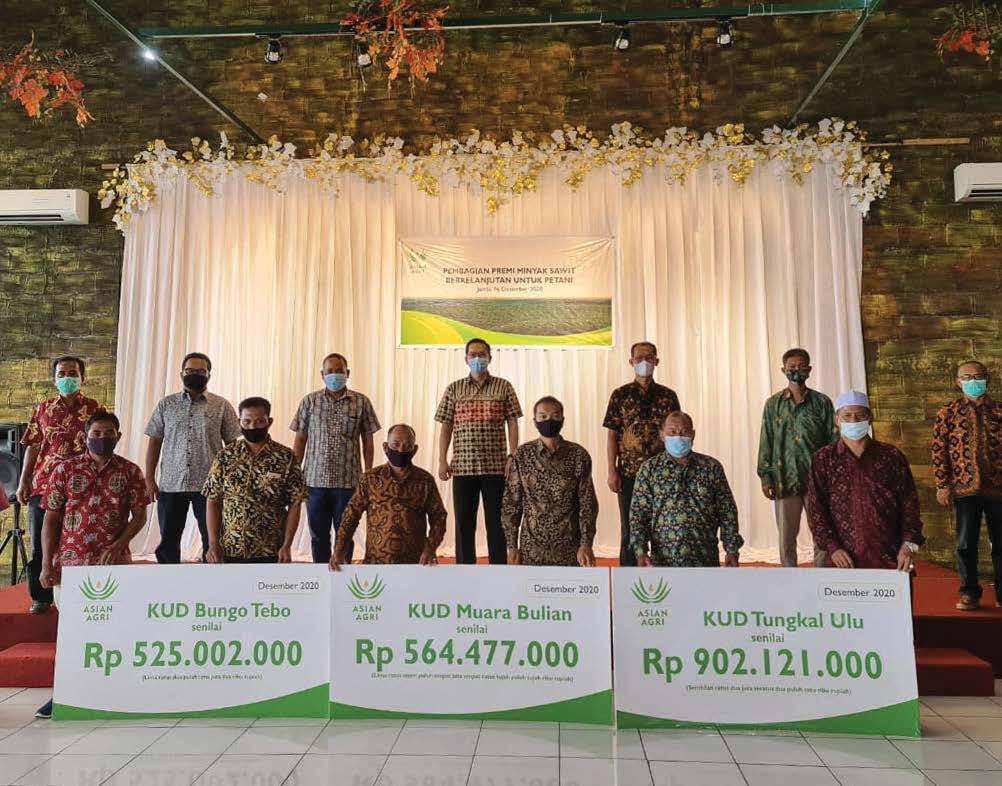
12 minute read
Smallholder Empowerment
A Pioneer in Smallholder Partnerships
Asian Agri has over 30 years of experience forging close partnerships with smallholders, since core strategy of our business since the very beginning, enabling us to establish a win-win partnership by securing a continuous and reliable supply of FFB while providing better livelihoods for smallholders. As of 2020, we work with more than 30,000 plasma scheme smallholders and 11,000 independent smallholders who manage around 60,000 Ha and more than 43,000 Ha of land respectively. By working closely with smallholders – both plasma scheme and independent – to improve their yields and produce sustainably, we are able to achieve the following outcomes:
Social impacts Improved livelihoods for smallholders through increased yield and incomes, which contributes to the nation’s strategic plan for sustained economic growth and rural development
Environmental impacts Improving yields and increasing replanting in order for smallholders to increase productivity without further land expansion
chemicals
30
years of experience forging close partnerships with smallholders
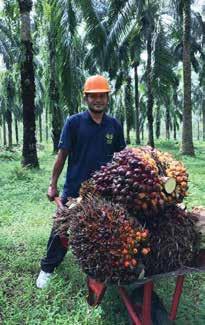
History of Our Plasma Scheme Smallholders Programme In 1987, Asian Agri was a pioneer in the Plasma Transmigration Programme (PIR-Trans), initiated by the Indonesian government to improve economic development in the country. Under the scheme, villagers from rural parts of Indonesia were relocated to oil palm growing areas and given two Ha of land for farming, as well as another 0.5 Ha for housing and growing food crops.
At the start, Asian Agri provided technical support to plasma scheme smallholders who agreed to sell their produce to us at a price set by the government. Over the years, we have continued to build up our plasma scheme smallholder programme and have introduced different forms of support for them.
of our scheme smallholders are ISCC
Our Journey Working with Smallholders
1987 Pioneered plasma scheme in Riau and Jambi through the Indonesia government’s Transmigration Programme (PIR-Trans)
1991 estate back to smallholders
2005 Imposed a moratorium on forest clearance and peatland development, including for all our smallholder partners, and have continued to focus on improving productivity in the existing land we manage 2012 Launched our independent smallholders programme in North Sumatra, Riau and Jambi, building on our successes of working with plasma scheme smallholders 2013 Achieved milestone of having Indonesia’s largest number of smallholder partners with
2014
2015 Our plasma scheme smallholders started replanting programme
2017 in 1987
2018 Succeeded in achieving our ‘One to One’ (1:1) partnership commitment, where 1 Ha of our own plantations is matched with 1 Ha of smallholder plantations
2019 Our independent smallholders started replanting programme
2020 Launched the SMallholder Inclusion for better Livelihood & Empowerment program (SMILE) project, a collaboration between Asian Agri, Apical and Kao Corporation
Supporting Our Plasma Scheme Smallholders
413-1
We currently support plasma scheme smallholders located in Riau and Jambi:
Jambi Regency District/Village West Tanjung Jabung Tungkal Ulu Batang Hari Muara Bulian Tebo Bunga Tebo Riau
Regency District/Village
Pelalawan Ukui Buatan Penarikan
Kampar Gunung Sahilan Indragiri Hulu Peranap
Number of plasma scheme smallholders
Number of plasma scheme smallholder groups Riau Jambi Total
14,803 11,012 25,815
659 494 1,153
Number of plasma scheme smallholder cooperatives (consisting of several smallholder groups) 38 34 72
Total planted area by plasma scheme smallholders (Ha) 29,456 23,449 52,905
To ensure we provide the best support for our plasma scheme smallholders, we have set up a dedicated Plasma Management Team which oversees all aspects of our support for smallholders. The strong partnership between our Plasma management team and our smallholders, built on a high level of trust and transparency, is key to our success. Asian Agri’s Plasma Management Team liaises with smallholder cooperatives to manage their smallholders. The cooperative has a role in organising and coordinating farmer groups, including managing FFB sales and monitoring the implementation of the guidelines consistently. Smallholders receive support from the Plasma Manager, assistants and foremen, who conduct regular meetings with cooperatives and farmer groups’ representatives. These meetings also provide an opportunity for smallholders to raise any technical issues they face or grievances towards the company.
Improving their livelihoods We purchase FFB from smallholders at a price referred by provincial government regulations. The price mechanism for our smallholders is communicated through weekly meetings. As part of our oil with them.
In 2019 and 2020, we distributed a total of IDR 9.7 billion to our plasma scheme smallholders. The premium earned was then used by cooperatives to improve agronomic training, village infrastructure and plantation infrastructure. By selling FFBs to our mills and through our additional support, our plasma scheme smallholders minimum wage.
Plasma scheme smallholder income trends compared with provincial minimum wage
In 2020, our smallholders in Riau earn around 70% higher than the provincial minimum wage, while those in Jambi earn around 40% higher than the provincial minimum wage
Riau
Jambi 2020 2019 2018
Our plasma scheme small-holders
Provincial Minimum Wage Our plasma scheme small-holders
Provincial Minimum Wage Our plasma scheme smallholders
Provincial Minimum Wage
4,986,000 2,888,564 4,674,000 2,662,025 5,876,000 2,464,154
3,625,000 2,630,162 3,362,000 2,423,889 4,662,000 2,243,718
Programmes to support plasma scheme smallholders We also provide further support for plasma scheme smallholders through the following programmes: 1. Knowledge sharing on best practices in palm oil management 2. Fire awareness and prevention 3. Replanting – Financial assistance – Land preparation – Providing quality seeds 4. Alternative sources of income
1. Knowledge sharing on best practices in palm oil management We provide smallholders with agricultural knowledge and technical skills in oil palm management. We have a team of dedicated staff providing training on fertiliser and chemical application (e.g. dosage, type, how to apply), caring for oil palms, harvest techniques, fruit quality, use of equipment and other areas.
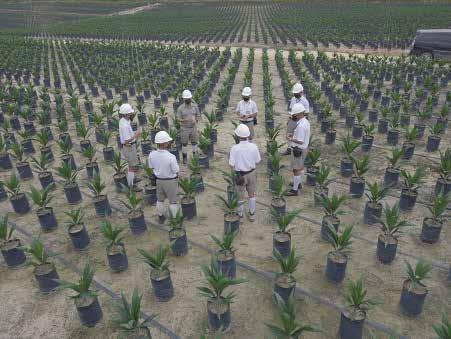
2. Fire awareness and prevention with our smallholders to help them opt for alternative methods to clear land. This includes providing them with heavy equipment and training to clear land without resorting to slash-and-burn techniques.
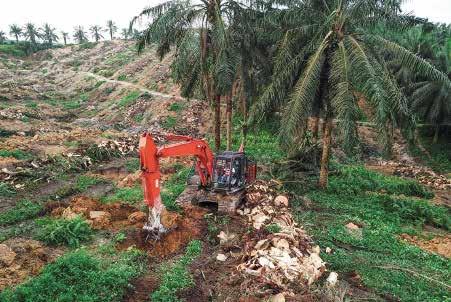
Our Topaz Seeds of 21 researchers at Asian Agri’s Oil Palm Research Station (OPRS). The superior seeds were created by cross-breeding four different seed varieties from around the world. Oil advantages including: • Producing superior yields even in poor quality soils • Having slow vertical growth making it easier to harvest its FFB • Reaching maturity at an earlier age: While the usual palm oil varieties produce its seeds can be harvested as early as 30 months With a capacity of 25 million germinated seeds per year, we are currently the third biggest seller of palm oil seeds in Indonesia. These seeds are sold to smallholders, used by Asian Agri company and also to other companies. More than 130 million seedlings have been shipped to large plantations, smallholders and independent farmers throughout Indonesia and abroad. For more information on our R&D efforts to produce new and more advanced seed varieties, refer to page 17. 3. Replanting Oil palms are at their prime from 8 to 18 years of age. After 25 years, their production starts to palms after 25 years. Replanted new oil palms usually takes between three to four years to become productive, during which farmers are unable to sell their FFB. Faced with this challenge, smallholders may choose to delay replanting instead, resulting in declining yields and lower income from their ageing trees.
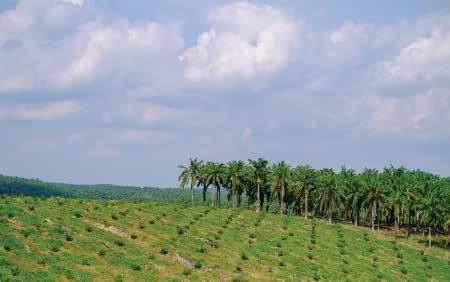
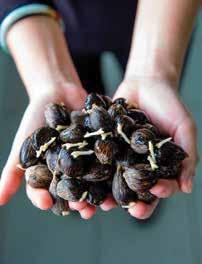
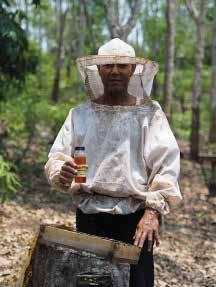
As such, our replanting programme is a holistic one consisting of three components of support. Every year, we support our smallholders to replant a target area of 3,000Ha. 1. Financial assistance: To help smallholders afford the seeds and other resources required for
Indonesian Palm Oil Plantation Fund Management Agency (Badan Pengelola Dana Perkebunan
Kelapa Sawit - BPDPKS). Asian Agri acts as guarantor for the bank and commits to continuing our support for the smallholders until they can fully repay their loans. 2. Land preparation: We help smallholders to prepare their land for replanting, starting by felling process from felling to holing the soil takes 6 months to complete. 3. Providing quality seeds: Supplying quality seeds to smallholders enables them to have bigger harvests without increasing their land area. The return on investment of high quality seeds is Since our plasma scheme smallholder replanting programme started in 2016, we have made progress in supporting our smallholders with replanting, covering around 3,300 Ha of plantations.
2016
2019 The following cooperatives, covering a total of 894 Ha, completed replanting: KUD Sawit Sabur (Ukui region) KUD Serangge Permai (Peranap region)
2020 The following cooperatives, covering a total of 1,654 Ha, completed replanting: KUD Sumber Bahagia (Ukui region) KUD Mulus Rahayu (Buatan region) KUD Bhakti Mandiri (Buatan region) KUD Jaya Makmur (Buatan region) KUD Serange Permai (Peranap region) KUD Karya Jaya (Tungkal Ulu region) KUD Sumber Usaha (Bungo Tebo region)
4. Alternative sources of livelihood Furthermore, as smallholders wait for their new oil palms to bear fruit, we help them to gain access to alternative sources of livelihood to tide through the waiting period.
well as other vegetable seeds. Apart from a source of livelihood, some produce can also have other uses. For example, cattle manure can be used as fertiliser, to produce biogas and for cooking. We also support farmers that want to expand into making handicrafts or other non-agricultural forms of business.
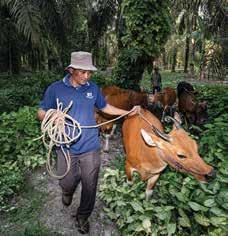
Sustainable Palm Oil (RSPO), Indonesian Sustainable Palm Oil (ISPO) and International Sustainability international markets such as Europe, allowing them to set a premium price from the sale of their produce. By implementing sustainable practices, they are also able to enjoy higher FFB yield. The purchasing safety equipment, and improve their overall livelihood.
2014
2017
2024
27 years and two generations with Asian Agri Syahmad migrated to Buatan in 1990 to begin oil palm farming as part of the Indonesian government’s transmigration programme. He was given 2.5 hectares of land – 2 hectares for oil palm, and 0.5 hectares for general agriculture, as well as a small wooden house. As a smallholder partner of Asian Agri, he received continuous training and guidance on best practices in oil palm cultivation. He also received support on fertilisers, pest and weed control. With each passing year, Syahmad and his family’s standards of living began to improve. After six years partnering with Asian Agri, he was also able to move to a new bigger house. 27 years on, he continues to partner Asian Agri, a partnership which is still going strong. education – something he never imagined as the son of a paddy farmer. Today, his eldest son, Rudiansyah, has already graduated from university and now works at Asian Agri as a Plasma Assistant, helping farmers like Syahmad who took part in the transmigration programme.

For more stories on our smallholder farmers, see our Youtube video series on smallholders here
From paddy to oil palm and hydroponics Jumadi was a paddy farmer in Java but found his seven children. In 2002, he took the leap of faith and moved his wife and children to Pangkalan Kerinci to start a new life as an oil palm farmer, using the little savings he earned as a migrant worker in Malaysia. He learned about Asian Agri as soon as he arrived in Riau and joined the Bina Karya farmer group which was a partner of the company. As a smallholder partner, Jumadi and other farmers received training on agricultural best practices and support in solving problems when they occurred. For example, when caterpillars attacked the smallholders’ plantations, Asian Agri carried out fogging to clear the infestation. On a separate occasion, Asian Agri conducted lab research to search fork solutions when the farmers discovered that the leaves of their oil palms were turning an unnatural yellow. and wanted to try his hand at it. With the support of Asian Agri, he and his wife built a greenhouse with hydroponic plants and sold their produce to the local community as supplementary income to their oil palm plantation. After more than four years, his business is thriving. With a well-managed hydroponic system in place, vegetables can be produced twice as fast. Life has improved since Jumadi chose to restart his life in Pangkalan Kerinci, evidenced by the fact that he and his wife were able to send three of their children to university.
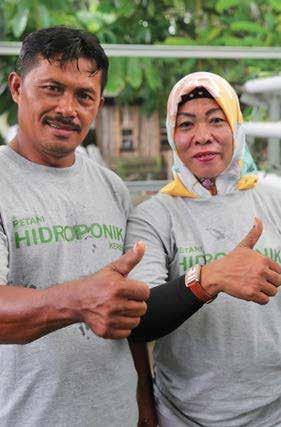
of smallholders in Indonesia are independent
Supporting Independent Smallholders
to the Chain Reaction Research, yet they tend to be heavily disadvantaged by various factors, agronomic practices which tend to be less productive and sustainable. While the palm oil industry has smallholders is still in its early stages. As such, we began supporting independent smallholders in 2012, building on our years of experience working with plasma scheme smallholders. Through our Corporate Shared Value (CSV) programme, we currently support more than 11,000 independent smallholders in North Sumatra, Riau and Jambi managing a total of more than 43,000 Ha of land. Building on the successes of and lessons learnt from our plasma scheme smallholder partnership programme, we provide a similar range of support for independent smallholders including helping them to form cooperatives, providing training on best practices, providing them with replanting support Cooperative or KUD), consisting of 247 smallholders managing 497Ha of land.
SMILE Programme In 2020, we launched a new initiative to help independent smallholders improve their yield, acquire Known as SMILE, or the SMallholder Inclusion for better Livelihood & Empowerment program, the collaboration includes two companies – Kao Corporation and Apical. The programme will assemble a team of experts to work with 5,000 independent smallholders that manage approximately 18,000 Ha of plantations in North and workshops, the experts will: • Educate farmers on how to improve their yields and sustainably manage their farms, as well as on the importance of staying committed to sustainable no exploitation • of helping independent smallholders secure RSPO • Provide training on how to implement robust safety measures across their estates, and safety extinguishers)
Sustainably managed plantations also lead to higher yield. Throughout SMILE’s implementation, the three companies will regularly engage various stakeholders such as NGOs, NPOs and community leaders to ensure competent delivery of training, adequate allocation of equipment, timely provision of needs at the estate and community level, as well as optimised collaboration towards building a more sustainable and traceable supply chain. Apart from SMILE, we also work with other partners such as IDH - The Sustainable Trade Initiative, Yayasan Setara Jambi and FORTASBI – to implement other programmes for independent smallholders.






